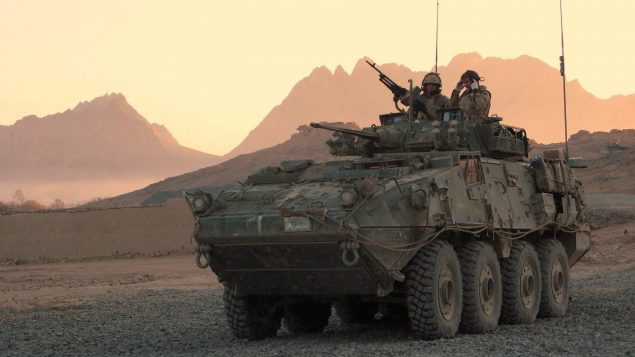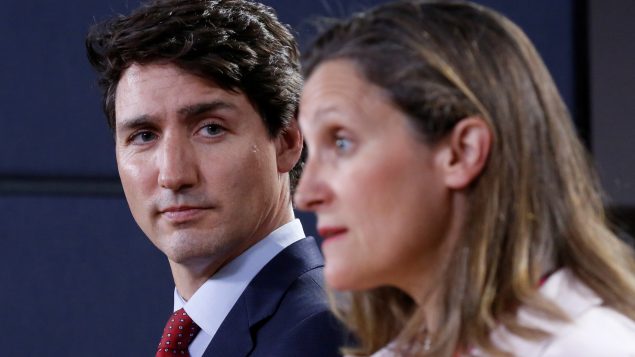Canadian officials are still seeking clarity about the measures Saudi Arabia is taking in response to Canada’s public criticism of the kingdom’s human rights record, government officials say.
But, at least for now, it seems neither Saudi exports of oil to Canada nor a multibillion deal to import Canadian-made light armoured vehicles have been affected by the escalating diplomatic crisis between the two countries.
The oil-rich kingdom has reacted with anger to a series of tweets by Canada’s foreign affairs minister and diplomats, urging Saudi authorities to “immediately” release jailed women’s rights activists.
Saudi Arabia has taken a number of drastic diplomatic and economic measures designed to punish Canada for what Riyadh says is “blatant interference” in its internal affairs, including expelling the Canadian ambassador on Sunday, blocking imports of Canadian grain, and ending state-backed educational and medical programs in Canada, as well as cancelling flights to and from Canada.
Canada’s Foreign Affairs Minister Chrystia Freeland had a long phone conversation with her Saudi counterpart Adel al-Jubeir on Tuesday to discuss the escalating crisis, Prime Minister Justin Trudeau revealed yesterday.
‘Chart a path forward’

Saudi Arabia’s Foreign Minister Adel Al-Jubeir speaks during a news conference in Riyadh, Saudi Arabia August 8, 2018. (Faisal Al Nasser/REUTERS)
A Canadian official speaking on background told Radio Canada International that the phone call was an “important opportunity” for Freeland to engage in dialogue directly with the Saudis about their concerns over Canada’s public criticism of the kingdom’s human rights policies.
Freeland also used the opportunity to seek more clarity about the measures the Saudi authorities plan to take against Canada, especially around some of the economic measures reported in media, the official said.
Canadian officials believe it’s important to have a dialogue to try to “chart a path forward,” the official said.
Canada has no intention of escalating the diplomatic row with Saudi Arabia and is trying to get the relationship “back on track,” the official added.
Freeland tried to explain to al-Jubeir that Ottawa’s public statements about human rights issues are part of the way Canada conducts diplomacy and while the Liberal government wants to maintain its relationship with Saudi Arabia, that’s not going to change, the official said.
There is also a concerted campaign by lower-ranking Canadian officials to get in touch with their Saudi counterparts to get more clarity on some of the reported Saudi measures, the official said.
Despite Sunday’s expulsion of Canada’s ambassador to Saudi Arabia, the embassy’s trade officers “are actively engaged with Canadian business interests and will continue to work with them and the relevant authorities in the coming days,” said Elizabeth Reid, a spokesperson for Global Affairs Canada.
Oil and arms deals unaffected so far

A Canadian LAV (light armoured vehicle) arrives to escort a convoy at a forward operating base near Panjwaii, Afghanistan at sunrise on Nov.26, 2006. (Bill Graveland/THE CANADIAN PRESS)
Saudi sanctions against Canada seem to have excluded two important sectors so far.
The current diplomatic crisis between Riyadh and Ottawa will not, in any way, impact Saudi oil exports to Canada, the kingdom’s Energy, Industry and Mineral Resources Minister Khalid al-Falih said Thursday.
There is also no word yet on the fate of a multibillion contract to supply Saudi Arabia with advanced light armoured vehicles produced in Canada.
In 2016, the Liberal government of Prime Minister Justin Trudeau approved the $15-billion deal signed under the previous Conservative government despite serious concerns raised by advocacy groups about the possibility that the vehicles may be used in the Saudi-led operation in Yemen or to commit human rights abuses internally.
The deal to export the LAV 6.0 model produced by General Dynamics Land Systems Canada (GDLS-C) in London, Ontario, is a private contract between a Canadian company and the Saudi government and it didn’t come up in the conversation between Freeland and al-Jubeir, the official said.
The LAV contract with Saudi Arabia is expected to support about 3,000 well-paying jobs in Canada for the next 12 years, according to the Canadian Association of Defence and Security Industries (CADSI).







For reasons beyond our control, and for an undetermined period of time, our comment section is now closed. However, our social networks remain open to your contributions.